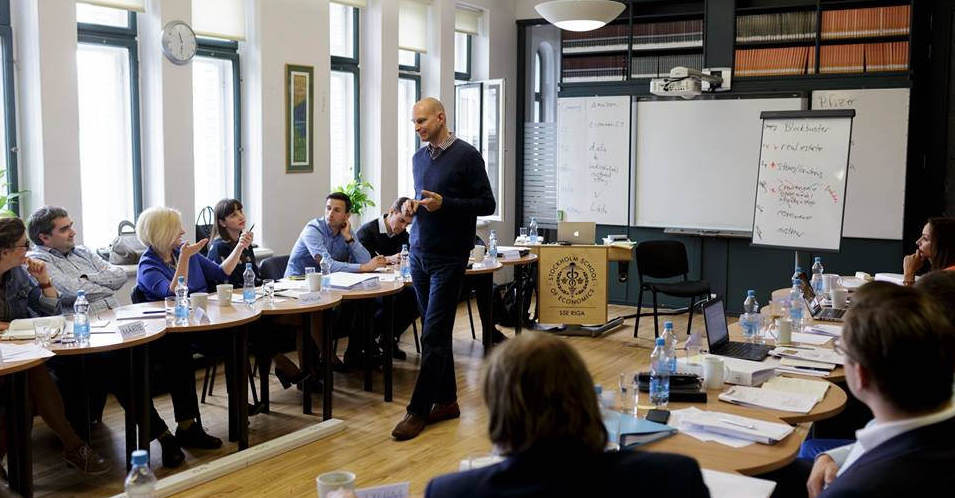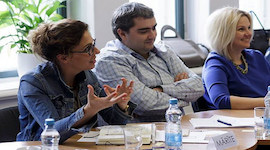 WDI’s executive education programs, delivered in partnership with the Stockholm School of Economics (SSE) in Riga, are attracting more international participants, bringing diverse opinions to the classroom and thereby adding value to the programs.
WDI’s executive education programs, delivered in partnership with the Stockholm School of Economics (SSE) in Riga, are attracting more international participants, bringing diverse opinions to the classroom and thereby adding value to the programs.
In past years, participants in the executive education offerings from WDI’s Education initiative at SSE Riga are citizens of host country Latvia and one or two neighboring Baltic countries. But for this year’s spring programs – the flagship, 10-day Strategic Management Program (SMP), Supply Chain and Logistics Management and Advanced Negotiations – drew participants not only from Latvia but also Russia, Chile, Estonia, Lithuania, Germany, Ukraine and even from as far away as Canada.
Santa Zeidaka, program manager at SSE Riga, said a key selling point is that its offerings are highly ranked in the Nordic and Baltic regions. She also said SSE Riga leverages its alumni network to spread the word on its programs and promotes them at conferences and on social media.
Zeidaka said a more international classroom benefits all the participants.
“Having an international group helps people open up more,” she said. “Participants get to see the problems from more diverse perspectives and this pushes participants to open their minds more, which is valuable when people work in international companies.”
For the popu lar SMP – also known as a “mini MBA” – participants came from Latvia, Lithuania, Ukraine and Canada. The program, tailored for high potential, mid- to senior-level managers, features four modules – strategy, finance, marketing, and leadership – and is structured around an integrative strategic framework. The program, held in May, combines lectures, discussions, cases and exercises. Participants also conduct group work, which enhances their critical thinking, decision-making and teamwork skills.
lar SMP – also known as a “mini MBA” – participants came from Latvia, Lithuania, Ukraine and Canada. The program, tailored for high potential, mid- to senior-level managers, features four modules – strategy, finance, marketing, and leadership – and is structured around an integrative strategic framework. The program, held in May, combines lectures, discussions, cases and exercises. Participants also conduct group work, which enhances their critical thinking, decision-making and teamwork skills.
Amy Gillett, vice president of WDI’s Education Initiative, said the fact that the SMP drew participants from four countries speaks to its strong reputation. She said participants around the world are recognizing the great value of this program.
“The Strategic Management Program is greatly enriched by having such a global audience,” she said. “Since the program is highly interactive with participants sharing their experiences, these diverse viewpoints spark new ideas and connections. Next year, we expect to attract participants from even more countries.”
This article traces the development of management education in Central and Eastern Europe over the past 30 years and provide recommendations for the future of management education in this part of the world. The authors, Danica Purg and Alenka Braček Lalić of IEDC-Bled School of Management, identify emerging business issues in Central and Eastern Europe and the resulting opportunities for institutions in the region to respond to these challenges with appropriate management and leadership development.
This article is part of the 25 Years of Market-Based Solutions article series released in honor of the William Davidson Institute’s 25th anniversary. Since its founding in 1992, the Education Initiative at the William Davidson Institute has helped management education institutions around the world develop their capacity. We look forward to continuing this work — and sharing key learnings — over the coming decades.

The walls of a kremlin, or citadel, within the Russian city of Kazan. Image credit.
WDI’s Education Initiative continues to expand global programming and partnerships with a new certificate course for mid- to senior-level managers in the southwest Russian city of Kazan.
The Executive Intensive Learning (EIL) course, delivered in conjunction with Kazan National Research Technical University and TISBI University of Management, is modeled off WDI’s highly successful Strategic Management Program (SMP). The 10-day course, structured as a “mini MBA,” will be held May 22-June 2 at TISBI in Kazan.
The program’s announcement follows the news in February that WDI would deliver the SMP in June in Tbilisi, Georgia for the first time. This program format has been run successfully in Latvia, Croatia and Slovakia for years.
“We’re excited to enter the Russian republic of Tatarstan,” says Amy Gillett, vice president of the Education Initiative at WDI. “This program is coming at an ideal time, as the economy in Kazan is growing, fueled by growth in the IT, banking, and manufacturing sectors. Bringing fresh thinking in leadership and management, and upgrading business skills will help managers grow their organizations and ultimately drive economic growth in the region. Kazan has been growing in prominence in the last decade and in 2009 was officially branded the ‘Third Capital of Russia.’”
The EIL is built on an integrative strategic framework and has modules in strategy, finance, government relations, and human resource management. Featuring lectures, discussions, cases, and exercises, each module session highlights the latest business management theory and fundamental general management principles. Attendees also participate in group work to help their critical thinking, decision-making, and teamwork skills.
Before the course, attendees will participate in an e-learning module on corporate finance designed by WDI to introduce general concepts in order to maximize classroom time at the program.
Additionally, the EIL will use the ExtendEd Portal, the customized online learning management platform developed by WDI, for participants to use before, during, and after the program.
The program will be conducted in English.
The WDI Faculty Affiliates teaching the EIL course are:
They will be joined by two faculty members from Kazan National Research Technical University who will teach government relations and human resource management.
More information please contact Nathan Rauh-Bieri, program coordinator for WDI’s Education Initiative.
Note: This is one in an ongoing series of articles profiling past WDI interns and Multidisciplinary Action Project (MAP) team members and their career paths. Additional profiles in the series may be found here.
It was a trip to the Soviet Union for a student exchange program when Per Hong was a high school junior that sparked his lifelong interest and passion to work in that part of the world. So when he had narrowed his choices to three business schools for his MBA studies – the Wharton School at the University of Pennsylvania, Dartmouth College’s Tuck School of Business and the University of Michigan Business School (as it was known then) – he decided on Michigan because of WDI’s international student projects.

“It was the selling point for why I chose the University of Michigan,” said Hong, now a partner with A.T. Kearney and managing partner of the firm’s Moscow office. “The opportunity to spend time working in the region on student projects was a differentiator for me.”
Hong, who majored in Russian as an undergrad at Swarthmore College, got his first WDI student opportunity in summer 1995.
His WDI internship was with LET Aeronautics, a Czech Republic manufacturer of 18- and 32-passenger propeller aircraft that was in the process of privatizing after the collapse of the Soviet Union. They prided themselves on having a fleet of aircraft designed to land on unfinished runways in Siberia.
With the collapse of the Soviet market, they were left with nearly 40 aircraft and wanted to certify their planes so they could be sold in the West. Hong developed a marketing strategy for LET, including how it could sell its refurbished, durable aircraft in new, hard-to-reach markets like Latin America and Africa.
“It was fascinating to work in a brand new part of the world,” Hong said of his time in the Czech Republic. “This was a very old and proud company that was now having to suddenly reinvent itself. They were faced with real market economy issues related to how they dispose of three years of inventory, restructure to get profitable and rebrand themselves. It was an enriching experience to work with an indigenous company about to go global, and the challenges they faced at all levels in transitioning to a market mindset.”
During his second year of MBA studies, Hong was part of a WDI-sponsored International Multidisciplinary Action Project – or IMAP – team at the business school. He and his classmates worked on a market entry strategy for Whirlpool appliances in Russia. As part of the project, the team spent two weeks in Moscow and St. Petersburg surveying firsthand the developing retail landscape for washing machines in a country making its transition to a market economy.
“In contrast to my experience in the Czech Republic where I worked for a Czech company, in Russia I was working for a multinational seeking to enter a new market,” Hong said. “I gained a whole new perspective and appreciation for the specific kinds of challenges Western companies were facing in trying to adapt themselves to operate in these new transitional economies.”
He said working in the two countries was an “immense training ground at the time,” and immersing himself in different business cultures “profoundly shaped” him.
Today, Hong has more than 20 years of consulting and industry experience in North America, Europe and Russia. Hong credits WDI and its student projects with sparking “a passion to serve clients in these markets that still shapes what I do today.”
“Without question, I’m pursuing my passion,” he said. “Today, while Russia’s political and economic climate is creating a whole new set of transitional challenges for companies in the region – in some ways not dissimilar to the volatility of the mid-90s – I still reflect on my early experiences with WDI. I like to think I offer both a unique insight and a passion to equip both my multinational and Russian clients with the means to compete and thrive in a global economy. WDI was core in launching me down this path.”